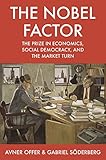The Nobel Factor : The Prize in Economics, Social Democracy, and the Market Turn / Avner Offer, Gabriel Söderberg.
Material type: TextPublisher: Princeton, NJ : Princeton University Press, [2016]Copyright date: ©2017Description: 1 online resource (344 p.) : 2 halftones. 29 line illus. 1 tableContent type:
TextPublisher: Princeton, NJ : Princeton University Press, [2016]Copyright date: ©2017Description: 1 online resource (344 p.) : 2 halftones. 29 line illus. 1 tableContent type: - 9780691196312
- 9781400883417
- 330.079 23
- HC54 .O345 2020
- online - DeGruyter
- Issued also in print.
| Item type | Current library | Call number | URL | Status | Notes | Barcode | |
|---|---|---|---|---|---|---|---|
 eBook
eBook
|
Biblioteca "Angelicum" Pont. Univ. S.Tommaso d'Aquino Nuvola online | online - DeGruyter (Browse shelf(Opens below)) | Online access | Not for loan (Accesso limitato) | Accesso per gli utenti autorizzati / Access for authorized users | (dgr)9781400883417 |
Frontmatter -- Contents -- List of Figures and Table -- List of Abbreviations -- List of Nobel Prize Winners in Economics, 1969- 2015 -- Preface and Acknowledgments -- Introduction -- 1. Imaginary Machines -- 2. A Prize in 'Economic Sciences' -- 3. Bitter Roots: Finance and Social Democracy between the Wars -- 4. The Riksbank Endows a Nobel Prize -- 5. Does Economics Have a Political Bias? -- 6. Individual Reputations (with Samuel Bjork) -- 7. Nobel Economics and Social Democracy -- 8. Models into Policy: Assar Lindbeck and Swedish Social Democracy -- 9. Swedosclerosis or Pseudosclerosis? Sweden in the 1980s -- 10. The Real Crisis: Not Work Incentives but Runaway Credit -- 11. Beyond Scandinavia: Washington Consensus to Market Corruption -- Conclusion: Like Physics or Like Literature? -- Bibliography -- Index
restricted access online access with authorization star
http://purl.org/coar/access_right/c_16ec
Economic theory may be speculative, but its impact is powerful and real. Since the 1970s, it has been closely associated with a sweeping change around the world-the "market turn." This is what Avner Offer and Gabriel Söderberg call the rise of market liberalism, a movement that, seeking to replace social democracy, holds up buying and selling as the norm for human relations and society. Our confidence in markets comes from economics, and our confidence in economics is underpinned by the Nobel Prize in Economics, which was first awarded in 1969. Was it a coincidence that the market turn and the prize began at the same time? The Nobel Factor, the first book to describe the origins and power of the most important prize in economics, explores this and related questions by examining the history of the prize, the history of economics since the prize began, and the simultaneous struggle between market liberals and social democrats in Sweden, Europe, and the United States.The Nobel Factor tells how the prize, created by the Swedish central bank, emerged from a conflict between central bank orthodoxy and social democracy. The aim was to use the halo of the Nobel brand to enhance central bank authority and the prestige of market-friendly economics, in order to influence the future of Sweden and the rest of the developed world. And this strategy has worked, with sometimes disastrous results for societies striving to cope with the requirements of economic theory and deregulated markets.Drawing on previously untapped Swedish national bank archives and providing a unique analysis of the sway of prizewinners, The Nobel Factor offers an unprecedented account of the real-world consequences of economics-and its greatest prize.
Issued also in print.
Mode of access: Internet via World Wide Web.
In English.
Description based on online resource; title from PDF title page (publisher's Web site, viewed 30. Aug 2021)


